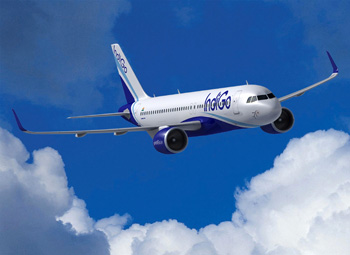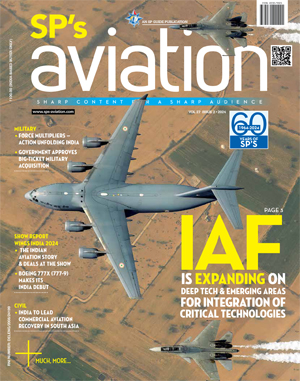INDIAN ARMED FORCES CHIEFS ON
OUR RELENTLESS AND FOCUSED PUBLISHING EFFORTS

SP Guide Publications puts forth a well compiled articulation of issues, pursuits and accomplishments of the Indian Army, over the years

I am confident that SP Guide Publications would continue to inform, inspire and influence.

My compliments to SP Guide Publications for informative and credible reportage on contemporary aerospace issues over the past six decades.
Mammoth Order for Aircraft by IndiGo
IndiGo Airlines has always enjoyed a cherished relationship with Airbus and stands out for large orders for airliners with the original equipment manufacturer.
 |
By Air Marshal B.K. Pandey (Retd) Former Air Officer Commanding-in-Chief of Training Command, IAF |

The Indian airline industry is abuzz with the reports in the media released on Monday August 17, 2015, that the nation’s leading low-cost carrier IndiGo Airlines has finalised a deal with the French aerospace major to purchase 250 Airbus A320neo airliners. The move to place orders for a large number of aircraft was initiated in October last year but could be finalised only now. The single largest order in terms of number of aircraft and second largest in value, the deal is reported to be worth more than $26 billion at list prices. Airlines however, do benefit from attractive discounts in such large orders. This deal is particularly significant for the Indian airline industry as it signals the possibility of rapid growth in air travel in the country. Assessment by experts of the growth of annual passenger traffic in India from around 190 million to 450 million and predictions for the country to consequently emerge as the third largest aviation market in the world by 2020, seems to be well within the realms of possibility.
Established in 2006 by InterGlobe Enterprises, budget carrier IndiGo that commenced regular operations in August that year, is the fastest growing and also the largest airline in India and leads with a market share of 35.8 per cent as recorded in July 2015. The airline has an impeccable record of On-Time-Performance and as reported in the media, this is the only Indian carrier that has consistently been in profit. Currently, the airline has a fleet of 97 Airbus A320 aircraft on its inventory and operates only a single type of aircraft both in the domestic and international segments.
The airline has always enjoyed a cherished relationship with Airbus and stands out for large orders for airliners with the original equipment manufacturer. At the Paris Airshow in 2005, IndiGo made waves by placing an initial order for 100 Airbus A320 aircraft for $6 billion. This was the largest single order recorded at the Airshow and deliveries against this order was completed in late 2014. This record set by IndiGo was superseded in 2006 when the state-owned Indian Airlines and Air India merged to form National Aviation Company of India that placed a combined order for 111 airliners from Boeing and Airbus.
Once again in January 2011, IndiGo signed a Memorandum of Understanding with Airbus for 180 Airbus A320 aircraft for $15 billion. One of the largest orders of its kind in commercial aviation history till date, the order included 150 of the cost-effective and eco-friendly A320neo version for which IndiGo was one of the launch customers. Deliveries of the A320neo are expected to commence only by the end of this year. With these large orders, in the Asian region, IndiGo was competing against Lion Air of Indonesia that had ordered a total or 464 aircraft in the years 2012 and 2013, a mix of Airbus A320neo and Boeing 737. The other competitor though of lower intensity, was AirAsia that in 2011, had placed an order for 200 Airbus A320neo aircraft.
Apart from plans for substantial growth and cost advantage, one of the reasons why the airline places large orders for airliners is to phase out from its inventory aircraft that are more than six years old. Some of the aircraft received against the initial order for 100, have already been retired from service. This philosophy of inventory management has helped the airline to keep the average life of the fleet low and consequently relatively free of technical problems. This in turn contributes to higher levels of air safety.
The order for 250 aircraft, which on the face of it appears unduly large for an Indian budget carrier, seems to be well-timed to boost sentiment before the airline goes from a private enterprise to become a public limited company through the issue of IPO. The airline hopes to raise $400 million through the sale of its shares up to 12 per cent. In any case the large orders are unlikely to become a financial burden for the Indian budget carrier as the airline can always pass on their bookings to other needy international carriers and rake in some profit in the process.





